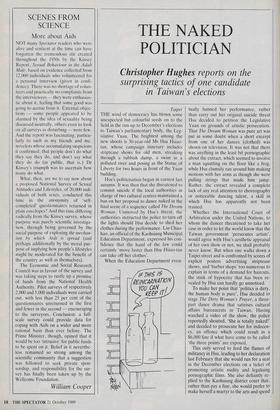SCENES FROM SCIENCE
More about Aids
NOT many Spectator readers who were alive and sentient at the time can have forgotten the tremendous stir created throughout the 1950s by the Kinsey Report, Sexual Behaviour in the Adult Male, based on evidence collected from 12,000 individuals who volunteered for a personal interview (given in confi- dence). There was no shortage of volun- teers and practically no complaints from the interviewees — they were enthusias- tic about it, feeling that some good was going to accrue from it. External objec- tions — some people appeared to be alarmed by the idea of sexuality being discussed neutrally, others even to look on all surveys as disturbing—were few. And the report was fascinating, particu- larly to such as my friends and me, novelists whose accumulating suspicions it confirmed; that people don't do what they say they do, and don't say what they do do (in public, that is.) Dr Kinsey's triumph was to ascertain how many do what.
What, then, are we to say now about a proposed National Survey of Sexual Attitudes and Lifestyles, of 20,000 indi- viduals of both sexes, conducted this time in the anonymity of 'self- completed' questionnaires returned in plain envelopes? And this time differing radically from the Kinsey survey, whose purpose was purely scientific investiga- tion, through being governed by the social purpose of exploring the mechan- ism by which Aids is spread (and perhaps additionally by the moral pur- pose of implying how people's lifestyles might be moderated for the benefit of the country as well as themselves).
The Economic and Social Research Council was in favour of the survey and was taking steps to rustle up a promise of funds from the National Health Authority. Pilot surveys of respectively 2,000 and 5,000 individuals were carried out, with less than 25 per cent of the questionnaires unreturned in the first and fewer in the second — encouraging to the surveyors. Conclusion: a full- scale survey could provide data for coping with Aids on a wider and more rational basis than ever before. The Prime Minister, though, opined that it would be too 'intrusive' for public funds to be spent on it. Belief in it neverthe- less remained so strong among the scientific community that a suggestion was followed to seek private spon- sorship, and responsibility for the sur- vey has finally been taken up by the Wellcome Foundation.
William Cooper


























































 Previous page
Previous page